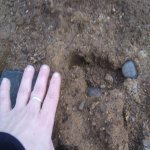Historical Implications
"The Triquet Island artifacts were 14,000 years old, implying that a group of people inhabited the island roughly 2,000 years before the end of the Ice Age. With these findings, archaeologists could confidently conclude that Triquet Island was never covered by one of the massive glaciers that engulfed Canada during this time period. This was a clear contradiction of what historians had believed up until this point in time. This realization would soon bring even more historical implications."
Just found this reference to a dig on the shore of Triquet Island off the coast of BC. This supports my contention that early man used boats. They found harpoon tips used for harpooning large animals. 14,000 years ago is 2000 years before the end of the ice age. Apparently the island was inhabited until a large tsunami wiped it out. Since it was an island and not affected by glaciers, the only way to get there was in boats. If mankind was there, they were likely all along the coast of BC. The true history of NA is covered in a 100 plus feet of water along our coastlines or covered by tsunami debris. This dig did not show anything until they were about 5 feet below surface soil. This was likely the same tsunami that is evidenced on the Washington coast that was over 300 feet tall.



